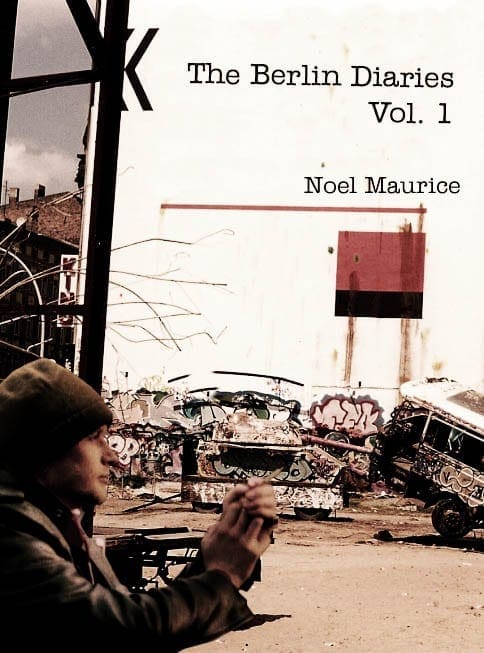Noel Maurice’s first installment of his trilogy The Berlin Diaries is charming, awkward, and surprisingly moving. While it is somewhat uneven, it hints at the promise of a gifted writer.
The central conceit is a coming of age story. The protagonist — Noel — is a young man who leaves England and goes hitchhiking, landing in post-communist East Berlin after a week on the road. There he encounters a host of eccentric exiles living in a squatter’s paradise called Tacheles and decides to stay on. In this welcoming new milieu, he learns about busking, he squats a flat, he realizes his dream of starting a band, he falls in and out of love, he suffers betrayal and the erosion of his dream, and he ultimately undergoes a personal transformation.
The corollaries of having drunken sex with a cheating East German housewife
The first two thirds of the book is a series of anecdotes linked together by drunken nights and hung-over mornings. There are three outstanding scenes in this earlier section — an enlightening encounter with a West German punk on the S-Bahn, a scene where Noel and his new friends squat an abandoned apartment, and the corollaries of having drunken sex with a cheating East German housewife.
In the scene with the punk, Berlin newcomer Noel takes a train to the East to see what he can see. Riding the S-Bahn over the war-haunted streets, he meets a young West German punk who fled to Berlin to avoid conscription. Peering through the door of the elevated train, the punk explains why the street passing below is so broad. It’s to allow quick access for tanks to enter the city center and quell protests. He cites a bloody rebellion in the fifties when—fed up with the communist government—the East Germans took to the streets, only to be crushed by Russian tanks. The scene ends on a philosophical pacifist note as the West German punk reflects, “That’s what they all do in end. East, West, commies, Nazis, everyone—in the end they just send in the fucking tanks.”
It manages to capture vividly the post-apocalyptic atmosphere of a city that has been rapidly abandoned.
There is a scene where Noel and his new friends squat an abandoned flat. After the Wall was torn down, many East Germans feared that it would be rebuilt, and so fled rapidly into the West, taking only what they could carry and leaving their homes intact—blocks upon blocks of rent-free townhouses where anyone with a will could break in and claim it as their own. This scene offers a vivid look into the actual process of squatting, with humorous moments (the friends almost squat a flat that has already been squatted,) and it manages to capture vividly the post-apocalyptic atmosphere of a city that has been rapidly abandoned—dust-covered furnishings, dishes still in sinks, etc.
The desolation that these realizations cause her, and Noel’s inability to offer any real help, is haunting and beautifully rendered.
The scene where Noel—after a bleary, alcohol-sodden night—sleeps with an East German woman he meets at a food stand is pivotal to the growing maturity (and ultimately the disillusion) of the main character. It is a moment where the endless party collides with the real world, forcing Noel to confront the superficiality of the squatter lifestyle and to consider the plight of the East Germans, many of whom never fled to the West when the Wall came down, but who live on in their old flats, struggling to adapt to the rapidly changing world around them.
In the morning awkwardness, the two have coffee together, and the woman reveals that not only is today her birthday, but that she walked out on her husband and two children the night before. She started drinking and ended up in Noel’s bed, and now she is hesitant to go home and see her children — who will have presents and will want to wish her a happy birthday — and to confess her infidelity to her husband. The desolation that these realizations cause her, and Noel’s inability to offer any real help, is haunting and beautifully rendered.
Noel’s transformation is informed by a pair of revelatory acid trips that are urgent and poetic, and have a stylized hallucinogenic flow.
Click the pic to buy the Ebook
Or write to info@indierepublik.tempurl.host to buy a physical copy for €11,99 plus postage.
A significant portion of the book is dedicated to Noel and his friends Marlon and Clemens’ efforts to start a band. Clemens is possibly the most sympathetic character in the book, and easily the most unique and well-realized. He is an earnest but optimistic goof, prone to bouts of intense concentration that he throws over in a wash of cheerful acceptance.
I don’t want to spoil the end of the book for you, but I will say that the very best part is the final third, and this section really takes the narrative to another level. Noel’s transformation is informed by a pair of revelatory acid trips that are urgent and poetic, and have a stylized hallucinogenic flow. He is forced to confront the past horrors of the city, the struggles of its citizens, and the disease within himself (symbolized by a mild case of leprosy.)
The villain (Noel’s ongoing dissolution) is unclear until these final chapters, but when the conflict finally appears, it is very effective. We transition from a light lad’s comedy to a darker and more contemplative tale, and the change is welcome. This is the depth that we were hoping for, that has been hinted at since the scene with the East German housewife.
I look forward to reading the rest of it.
Book review by Lawrence Benner
Get the ebook on Amazon – The Berlin Diaries Vol. I: Tacheles ’91 (English Edition)
Buy the physical book from us for just €11,99 plus postage by writing to info@indierepublik.tempurl.host.
Go to noelmaurice.com to get the first three chapters free, as well as updates about the progress of Vol. II!



